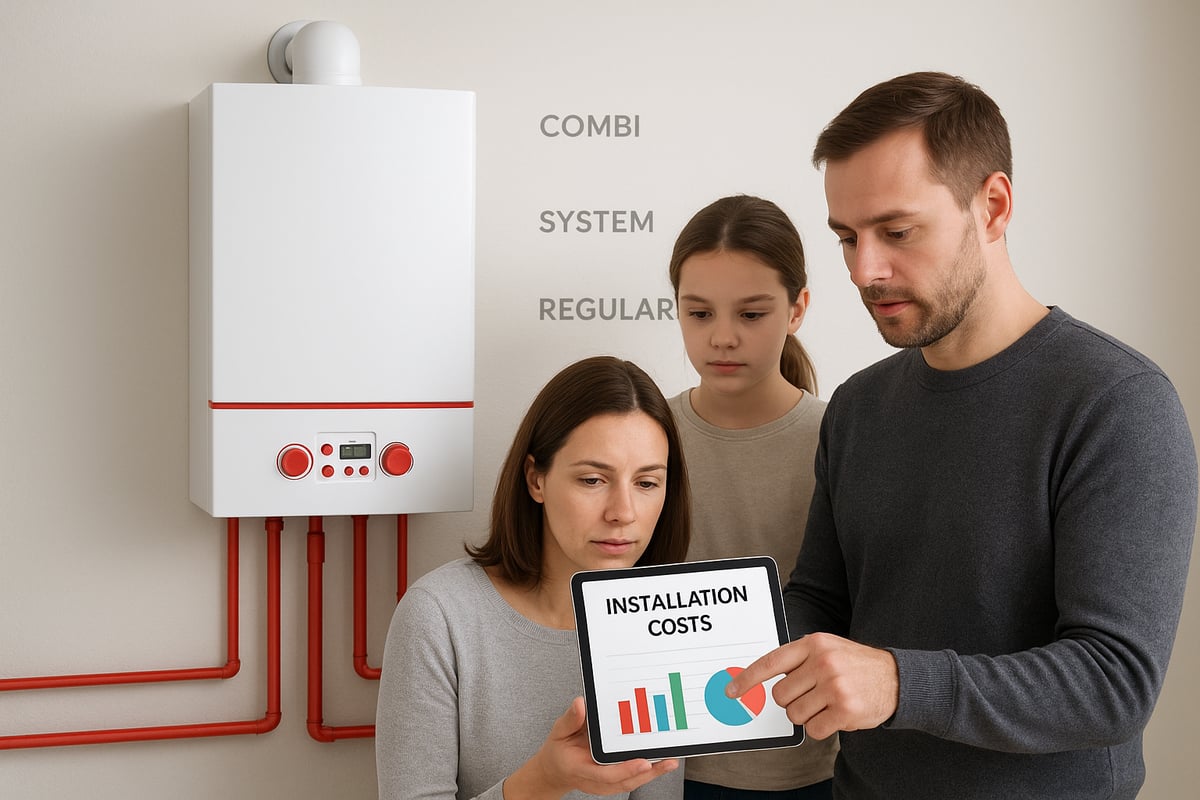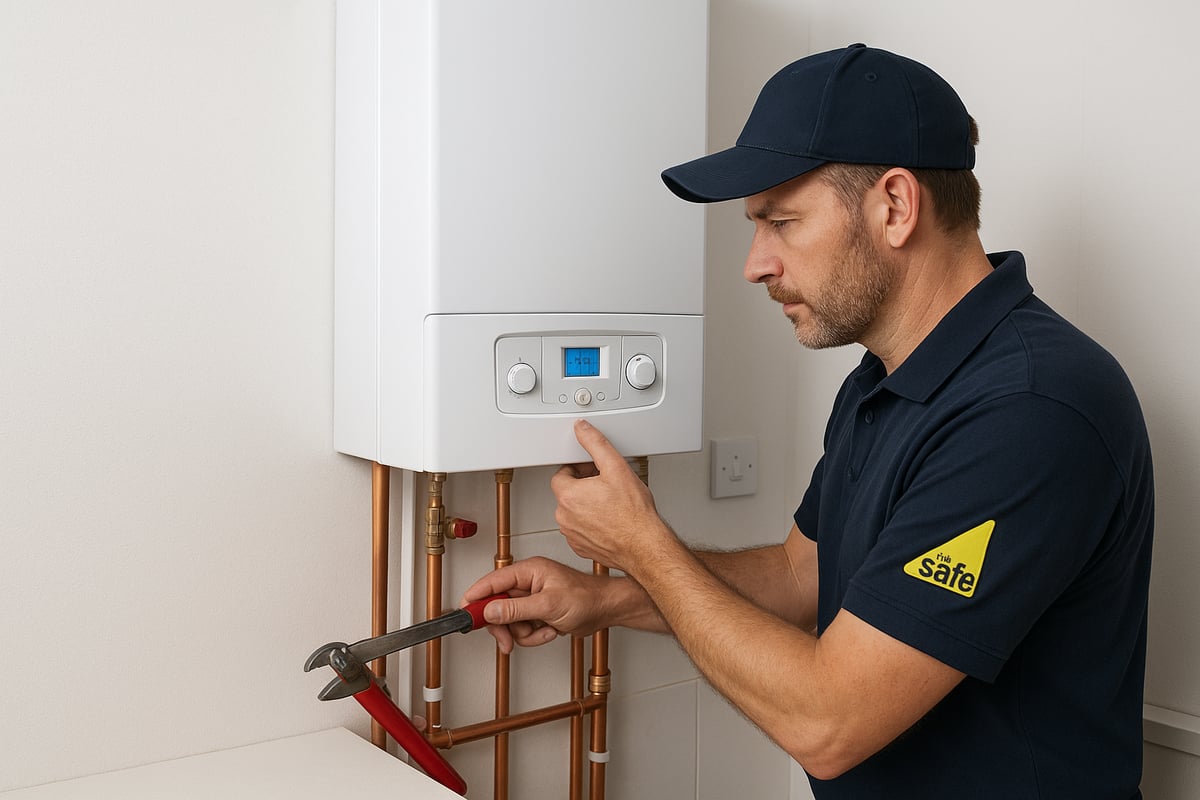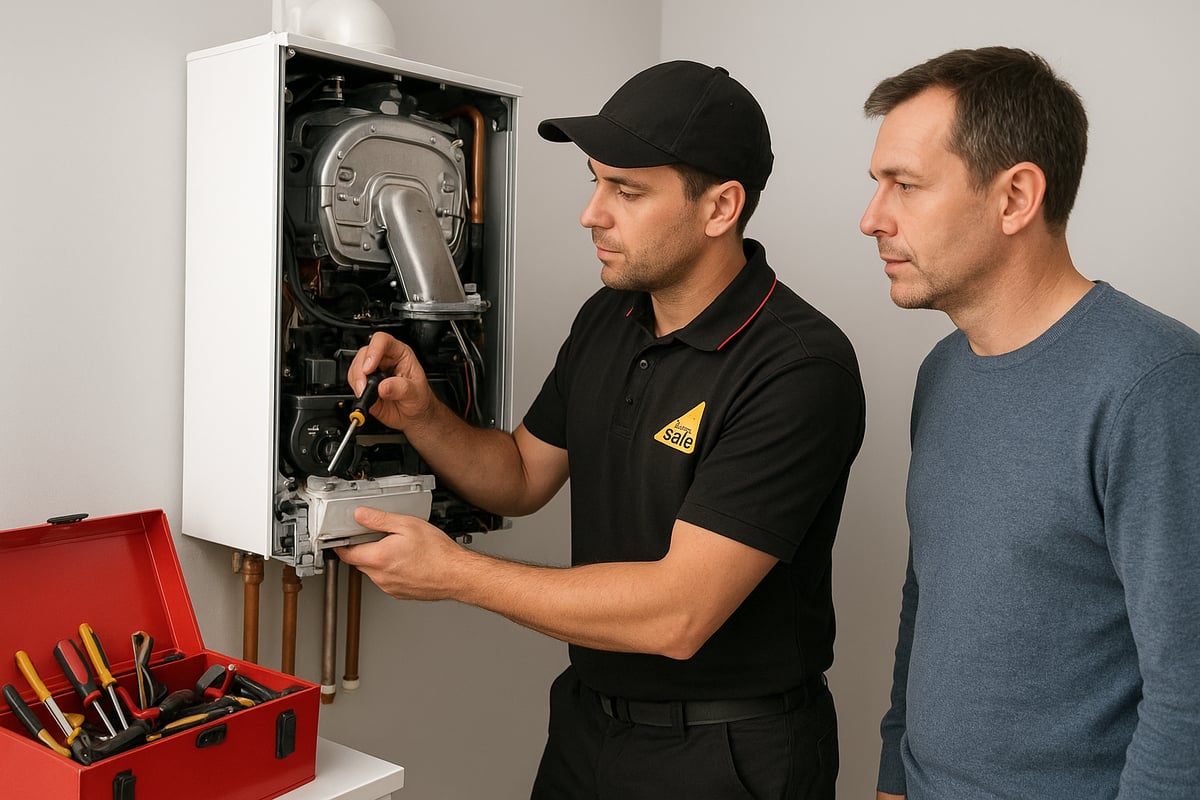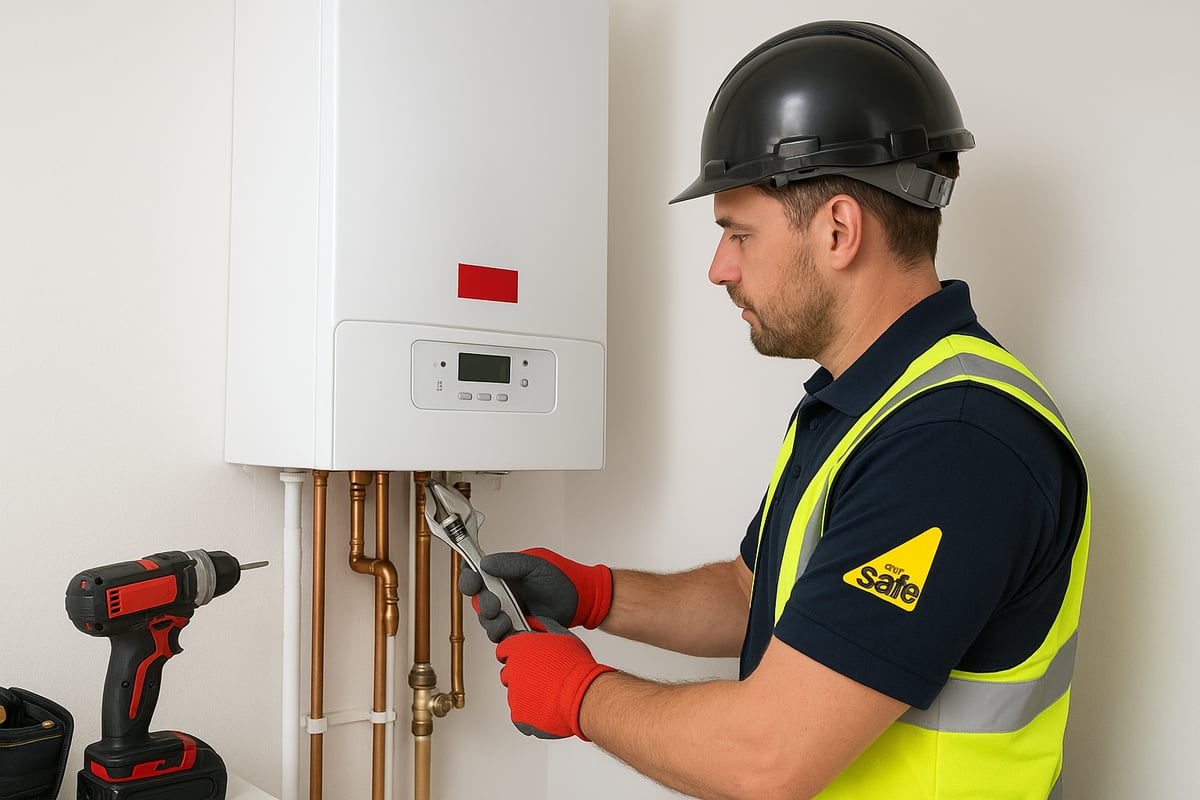The Essential Guide to Cost of Boiler and Installation 2025
Rising energy prices and tighter regulations are making the cost of boiler and installation a top concern for UK homeowners and landlords in 2025. Understanding what you will pay, and why, is more crucial than ever. This essential guide breaks down every factor from boiler types and installation fees to hidden charges, new rules, and money-saving strategies. By the end, you will be equipped to make smart, budget-friendly choices and avoid any costly surprises.
Understanding Boiler Types and Their Costs in 2025
Choosing the right boiler for your home in 2025 requires a clear understanding of the available options, their features, and how they affect the overall cost of boiler and installation. Each type comes with distinct benefits and price points, making it crucial to match your choice to your property’s needs and future regulations.

Overview of Boiler Types Available
In 2025, homeowners can choose from combi, system, and regular boilers, as well as newer technologies like hydrogen-ready, electric, and hybrid models.
Combi boilers are compact units that provide instant hot water and heating, making them ideal for small homes or flats. System boilers work well for larger households with higher hot water demand, using a separate cylinder for storage. Regular (conventional) boilers are suitable for properties with traditional heating setups and multiple bathrooms.
Emerging models, such as hydrogen-ready and hybrid boilers, are designed to meet stricter energy standards and future-proof your investment. Matching the right boiler to your home’s size and usage is a crucial step in controlling the cost of boiler and installation.
Average Boiler Costs by Type in 2025
The cost of boiler and installation varies significantly depending on the type, brand, and model you select. In 2025, combi boilers typically range from £1,800 to £3,500, while system boilers fall between £2,000 and £4,000. Regular boilers are often priced similarly to system models, but installation complexity can push costs higher.
Compared to 2024, prices have seen a moderate rise due to inflation and changes in manufacturing. Premium brands offer extended features and longer warranties, but budget-friendly models remain available for those seeking lower upfront costs.
For a more detailed breakdown of combi boiler prices, see this comprehensive guide on combi boiler prices in the UK.
Impact of Energy Efficiency and Regulations on Price
Energy efficiency standards in 2025, such as Boiler Plus and ErP, have a direct influence on the cost of boiler and installation. New regulations require all replacement boilers to meet minimum efficiency thresholds, with hydrogen-ready and A-rated models becoming the norm.
While these high-efficiency units may increase upfront costs, they deliver savings on energy bills over time. Homeowners may also benefit from government incentives for choosing low-carbon options, or face penalties for retaining outdated systems.
Selecting a compliant, efficient boiler is essential for both regulatory approval and long-term financial benefits.
Warranties and Lifespan Factors
Manufacturers in 2025 typically offer warranties ranging from 5 to 10 years, covering parts and labour. Longer warranties often come with higher purchase prices, but they provide peace of mind and reduce future repair risks.
The expected lifespan of modern boilers is 10 to 15 years, depending on build quality and maintenance. Leading brands sometimes include extended warranties as standard, which can impact the overall cost of boiler and installation.
It is wise to compare warranty terms closely, as better coverage can offset higher initial expenses.
Real-World Pricing Examples
The true cost of boiler and installation depends on property type, location, and specific requirements. For example, a 2-bedroom terraced house in the North East might expect to pay around £2,200 for a new combi boiler including installation. In contrast, a 4-bedroom detached home in London could see costs exceed £4,000 for a system boiler with upgraded controls.
Industry reports reveal regional price differences, with London and the South East generally commanding higher rates than areas like Manchester or Scotland.
Gathering multiple quotes and factoring in local market trends helps ensure you receive the best value for your investment.
Key Factors Influencing Boiler Installation Costs
When planning for a new boiler, understanding the key factors that drive the cost of boiler and installation is essential. Each property is unique, and several elements can make prices vary significantly. Let’s break down what you need to know so you can budget with confidence.

Labour and Installation Complexity
Labour is a substantial part of the cost of boiler and installation in 2025. Gas Safe engineer rates typically range from £500 to £1,500, depending on the nature of the work. If you are replacing a like-for-like system, labour costs tend to be lower. However, installing a new type of boiler or moving its location can significantly increase the total.
For example, relocating a boiler often requires extra pipework, wall repairs, and updated safety checks, all of which add to the bill. For a detailed breakdown of these variables, see this comprehensive boiler installation cost breakdown.
Complexity increases with older or larger properties, as engineers may face hidden challenges that affect the final cost of boiler and installation.
Additional Components and Upgrades
Beyond the boiler itself, additional components can impact the cost of boiler and installation. Common extras include:
- New flues or vertical extensions
- Upgraded pipework or radiators
- Smart thermostats and heating controls
- Magnetic filters and limescale reducers
Each of these upgrades can add £100 to £800 per component. For instance, fitting a smart thermostat gives you greater control over your heating but adds to the upfront investment. Factoring in these extras ensures you get a full picture of the cost of boiler and installation from day one.
Property-Specific Considerations
The age, layout, and type of property play a major role in the cost of boiler and installation. Older homes may have inaccessible pipework, outdated systems, or limited space for modern boilers, which increases both labour and materials.
Listed buildings or flats with strict regulations or shared systems often require specialist installation. If you are converting from a conventional to a combi system, expect extra costs for removing water tanks and adjusting pipework. Always have your installer assess your property to provide an accurate estimate of the cost of boiler and installation.
Removal and Disposal of Old Boiler
Disposing of your old boiler is another important aspect of the cost of boiler and installation. Removal and disposal fees typically range from £100 to £300. Environmental regulations require safe handling, especially if asbestos or other hazardous materials are present.
Installers must follow strict guidelines for recycling or disposing of old units. If hazardous materials are discovered, specialised removal companies may be needed, which can increase the cost of boiler and installation. Always check what is included in your installer’s quote to avoid surprise charges.
Compliance, Certification, and Safety Checks
Every new boiler installation must comply with UK safety standards, affecting the cost of boiler and installation. Gas Safe certification is mandatory for all engineers, and post-installation safety certificates are required.
Building Regulations, such as Part P for electrical safety, may also apply. Certification fees, which range from £50 to £150, are usually included but always confirm this upfront. Ensuring compliance protects your investment and guarantees the safety and efficiency of your new system, making it a crucial part of the cost of boiler and installation.
Regional and Seasonal Variations
The cost of boiler and installation varies across the UK. For example, installation in London or the South East is often higher than in the North East or Scotland due to labour rates and demand. Here is a quick comparison:
| Region | Average Installation Cost |
|---|---|
| London | £2,000 – £3,000 |
| Manchester | £1,800 – £2,700 |
| Kent | £1,900 – £2,800 |
| Scotland | £1,700 – £2,600 |
Seasonal demand also affects prices. Peak winter months see higher costs and longer waits, while summer installations may be cheaper and more convenient. Planning ahead helps you secure the best value for the cost of boiler and installation.
Hidden and Ongoing Costs to Consider
Staying on top of hidden and ongoing expenses is crucial when calculating the true cost of boiler and installation. These costs can add up quickly, impacting your annual budget and long-term savings. Understanding them ensures you avoid unpleasant surprises and maintain your boiler efficiently.

Annual Servicing and Maintenance
Regular servicing is essential to keep your boiler running safely and efficiently. In 2025, annual servicing typically costs between £80 and £120, with prices varying by region and boiler type. Skipping this service can invalidate your warranty and reduce your boiler's lifespan.
You can find a detailed Boiler service UK cost breakdown to help you budget accurately. Tasks during a service include safety checks, cleaning, and identifying wear or leaks. Investing in routine maintenance is a smart way to manage the ongoing cost of boiler and installation, often saving money by preventing major faults.
Unexpected Repairs and Emergency Call-Outs
Even with regular maintenance, unexpected breakdowns can occur. Common repairs include faulty valves, pumps, or sensors, which often cost between £100 and £300 per fix. Emergency call-outs, especially during winter, can add another £100 to £250 or more to your bill.
A sudden loss of heating on a cold evening can be stressful and expensive. Factoring these scenarios into your annual budget ensures you are prepared for the unpredictable cost of boiler and installation. Consider setting aside an emergency fund to cover these potential expenses.
Energy Bills and Long-Term Running Costs
The efficiency of your new boiler plays a direct role in your energy bills. A-rated boilers and hydrogen-ready models can save you hundreds of pounds per year compared to older, less efficient units. With gas and electricity prices predicted to remain high in 2025, choosing an efficient model is more important than ever.
Over time, the cost of boiler and installation can be offset by these energy savings. For example, upgrading to an A-rated boiler may reduce your annual bills by £200 or more, helping you recover your initial investment faster.
Insurance and Extended Warranties
Boiler cover plans are available from around £10 to £25 per month, usually including annual servicing, repairs, and emergency call-outs. Extended manufacturer warranties, often lasting 5 to 10 years, can provide additional peace of mind but may come at a higher upfront cost.
When weighing the cost of boiler and installation, consider whether insurance or a warranty extension suits your needs. For some, pay-as-you-go repairs may work out cheaper, while others prefer the security of comprehensive coverage.
Step-by-Step Guide to Boiler Installation in 2025
Embarking on a new boiler installation can feel overwhelming, especially with changing regulations and technologies in 2025. This step-by-step guide will help you navigate every stage, ensuring you understand the true cost of boiler and installation and avoid unexpected hurdles.

Step 1: Assessing Your Heating Needs
The first step in controlling the cost of boiler and installation is to assess your property’s unique requirements. Consider the size of your home, the number of bathrooms, and your daily hot water demand. A professional heating survey, either in-person or via a reputable online calculator, will help you determine the correct boiler size and type.
For example, a three-bedroom family home with two bathrooms typically requires a system or large combi boiler. Accurate assessment at this stage prevents overspending on unnecessary capacity, directly influencing the overall cost of boiler and installation.
Step 2: Choosing the Right Boiler and Installer
Selecting the right boiler and a qualified installer is essential for both safety and value. Compare different brands, focusing on reliability, warranty, and energy efficiency features. Ensure your installer is Gas Safe registered and experienced with modern systems.
When reviewing options, ask potential installers about their experience, aftercare services, and any hidden costs that could affect the total cost of boiler and installation. Taking time to vet both the boiler and the professional will save money and stress in the long run.
Step 3: Getting Accurate Quotes
Obtaining multiple quotes is vital to understanding the market rate for the cost of boiler and installation. Make sure each quote is itemised, listing labour, parts, additional components, and any extras such as smart controls or filters.
Here’s a sample itemised quote structure:
| Item | Estimated Cost |
|---|---|
| Boiler (combi/system) | £2,200 |
| Labour | £900 |
| Flue & pipework | £200 |
| Smart thermostat | £150 |
| Total | £3,450 |
Review each quote carefully, comparing not just the headline price, but also the services included. This transparency helps you avoid hidden charges and keeps the cost of boiler and installation within budget.
Step 4: Preparing for Installation Day
Proper preparation ensures a smooth installation, helping to control the overall cost of boiler and installation. Clear the area around your existing boiler and provide easy access for installers. Make sure there is parking available, and that water and electricity supplies are accessible.
Prepare for some disruption, especially if major pipework changes are required. A typical installation, including removal and fitting, may take one to three days. Setting clear expectations with your installer can prevent delays that might increase the cost of boiler and installation.
Step 5: The Installation Process
The installation itself involves several key stages: safe removal of the old boiler, fitting the new unit, updating pipework, and completing safety checks. Depending on complexity, the process may be completed in a single day or span several days for more involved jobs. For a detailed breakdown of what to expect, including typical timeframes, see How long does boiler installation take.
Throughout the installation, your engineer will test the system and ensure compliance with safety standards. Each step is crucial for guaranteeing performance and protecting the cost of boiler and installation investment.
Step 6: Post-Installation Checks and Handover
Once the installation is complete, your installer will conduct final safety checks and demonstrate how to use your new boiler. You’ll receive important paperwork, including the warranty, Gas Safe certificate, and user manual. Registering your warranty and notifying Gas Safe are essential to secure your investment and maintain compliance.
Expect a handover pack with all relevant documentation. This final step ensures the cost of boiler and installation delivers long-term value, safety, and peace of mind.
How to Save Money on Boiler and Installation Costs in 2025
Rising energy bills and new regulations mean homeowners and landlords are looking for ways to lower the cost of boiler and installation in 2025. Fortunately, several strategies can help you save without compromising on quality or safety.
Comparing Quotes and Negotiating
To get the best value, always compare at least three quotes for the cost of boiler and installation. Prices vary widely between installers, and competition means you may be able to negotiate extras, such as free thermostats or discounted servicing.
- Ask for itemised quotes to compare like-for-like
- Enquire about price match guarantees
- Request written confirmation of any discounts
Some national installers offer price match policies, so use competitor quotes as leverage. Remember, the lowest price is not always the best option. Ensure each quote covers all work, including removal and certification, to avoid hidden costs related to the cost of boiler and installation.
Utilising Government Grants and Incentives
In 2025, government schemes can significantly offset the cost of boiler and installation. The Boiler Upgrade Scheme offers grants to help with the transition to low-carbon heating, such as heat pumps or hydrogen-ready boilers.
Eligibility depends on property type and existing heating systems. You could save between £500 and £1,500 if you qualify. For full details on how to apply and check your eligibility, visit the Boiler Upgrade Scheme grants page.
Check with your local council for additional support, as some regions provide extra incentives. Taking advantage of these schemes is a smart way to reduce your upfront investment.
Choosing Energy-Efficient Models
Opting for an A-rated or hydrogen-ready boiler may increase the initial cost of boiler and installation, but the long-term savings can be substantial. Modern boilers use less fuel, resulting in lower energy bills and a reduced carbon footprint.
Consider the payback period by comparing the extra upfront cost to projected annual savings. For example, upgrading from a G-rated to an A-rated boiler can save up to £300 per year, meaning the investment pays for itself in just a few years.
Always look for models that meet or exceed 2025 efficiency regulations to future-proof your heating system and avoid potential penalties.
Spreading the Cost with Finance Options
Many installers now offer finance options to help manage the cost of boiler and installation. Spreading payments over several years can make upgrades affordable, especially if you choose interest-free or low-interest deals.
- Check eligibility requirements before applying
- Compare monthly payments with total repayment amounts
- Ask about early repayment penalties
For more on the benefits and drawbacks of finance, see Paying for a new boiler through finance. Always review your budget to ensure repayments are comfortable and consider whether finance or upfront payment is best for your circumstances.
DIY and Maintenance Tips to Reduce Costs
Simple maintenance tasks can help keep the cost of boiler and installation down over time. Regularly bleeding radiators, checking boiler pressure, and keeping vents clear can improve efficiency and prolong your system's lifespan.
However, only attempt basic jobs unless you are confident and safe. For anything involving gas or electrical components, always hire a professional. Preventative care reduces the risk of breakdowns and costly emergency call-outs, making your investment in a new boiler go further.
What to Expect from Boiler Installation Regulations and Trends in 2025
Understanding the evolving landscape for the cost of boiler and installation in 2025 is crucial for homeowners and landlords. With new rules on the horizon, plus rapid innovation, knowing what is coming can help you budget effectively and avoid compliance pitfalls.
Latest UK Boiler Regulations
In 2025, the regulatory environment for boiler installation is stricter than ever. Homeowners must comply with Boiler Plus standards, which set minimum efficiency requirements for all new installations. The government is also pushing for hydrogen-ready boilers as part of the Net Zero targets, and certain types of boilers are now banned in new-build properties.
The UK boiler installation regulations 2025 outline the Product Regulation and Metrology Act, specifying new standards for efficiency, safety, and environmental impact. These rules directly affect the cost of boiler and installation, as only compliant models can be installed, and non-compliance may result in fines or costly retrofits.
For property owners, staying informed about these standards is essential to avoid unexpected expenses or delays.
Industry Innovations and Trends
The heating industry in 2025 is rapidly embracing new technologies. Smart controls, hybrid systems, and renewable energy integration are now mainstream, offering increased efficiency and convenience. The market share of hydrogen-ready and electric boilers is growing, reflecting the shift towards greener solutions.
Recent reforms have made it easier to adopt low-carbon heating, with heat pump adoption statistics showing significant growth across the UK. This affects the cost of boiler and installation, as many homeowners weigh the benefits of hybrid or fully renewable options. Integration with solar PV or heat pumps is increasingly common, and many installers offer packages tailored to these trends.
Choosing the right technology ensures your investment remains future-proof and compliant.
Future Cost Predictions and Market Outlook
Looking ahead, the cost of boiler and installation is expected to remain under pressure from both supply chain fluctuations and rising energy prices. Industry forecasts for 2025–2030 suggest that while upfront prices may see moderate increases, long-term savings from energy-efficient models could offset these costs.
Market data highlights regional variations, with some areas facing higher labour or material expenses. Technological advances, such as improved heat exchangers and digital controls, may also influence pricing structures. Staying alert to these trends allows homeowners to plan and budget more accurately.
In summary, understanding future cost drivers helps you make informed installation choices.
Now that you have a clearer picture of what impacts boiler and installation costs in 2025—from the types of boilers available to the hidden and ongoing expenses—it’s important to choose a heating partner you can trust. At Castle Heating Kent, we combine over 20 years of expertise with transparent, upfront pricing and flexible finance options, making it easier for you to make informed, budget-friendly decisions for your home. If you’re ready to take the next step toward a warmer, more efficient property, you can Keeping Homes in and around kent Warm, Dry & Flowing Book with castle heating kent for a free, no obligation quote and personal guidance from our friendly team.

